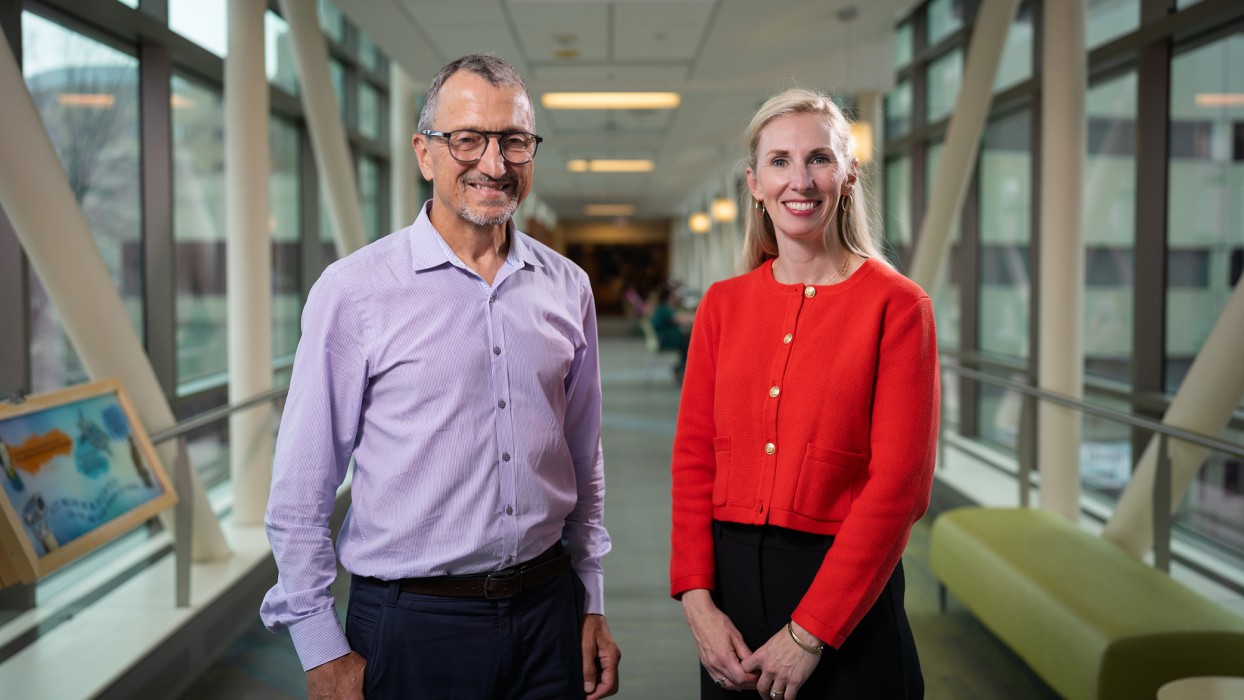Gillette Children’s Cerebral Palsy Institute is dedicated to promoting independence and improving the quality of life for individuals with cerebral palsy (CP). Led by a team of renowned experts in the field, the Cerebral Palsy Institute helps shape the future of CP care and research.
Gillette chose Andrea Bushaw, PhD, APRN, CPNP, manager of clinical transformation, and Tom Novacheck, MD, pediatric orthopedic surgeon, to lead the Institute’s knowledge translation efforts.
Knowledge translation refers to the process of moving research findings into practical applications that can improve people’s lives. In the case of the Cerebral Palsy Institute, the knowledge translation team aims to implement discoveries and advancements in the care of cerebral palsy, informing clinical practice, program development, and public health policy.
“Simply put, we work to narrow the research-to-practice gap by creating evidence-based system changes that are scalable, sustainable, and measurable,” says Dr. Bushaw. “To accomplish that aim, our approach is to increase collaboration among researchers and clinicians, reduce the time for research evidence to reach clinical practice, and share our expertise with others in the field.”
Current Accomplishments
One of the highlights of the knowledge translation program at the Institute is the staffed Clinical Transformation Specialist role, which is a clinically credentialed evidence-based practice (EBP) mentor and implementation science expert. EBP is a problem-solving approach that integrates patient values, clinician expertise, and the best available evidence to inform decisions for a specific patient.
In addition to adding staffed clinical transformation roles, the group launched a clinical practice pilot for hip surveillance in patients with cerebral palsy. “We’ve implemented the American Academy for Cerebral Palsy and Developmental Medicine’s (AACPDM) hip surveillance care pathway, starting with a cohort of patients who have CP and multidisciplinary needs,” says Dr. Novacheck. “We anticipate fully implementing the pathway by the end of 2023. Other aspects of proactive, multidisciplinary care were also included as part of the pilot.”
Looking Ahead
The future of knowledge translation at the Cerebral Palsy Institute looks bright. Dr. Bushaw says, “By 2030, I hope to have a fully operationalized learning health system where we can systematically gather and create evidence, as well as apply the most promising evidence to improve the care of our patients.” “I am most excited to fully implement Mosaic, which has multiple aims. It will allow us to manage an individual’s care from the database, perform internal outcomes research, and contribute data to the Cerebral Palsy Research Network (CPRN). A crucial element of this work includes collecting and storing data in new ways, so researchers and clinicians can ask population-level questions about our CP patients and evaluate individual patient data longitudinally,” says Dr. Novacheck.
Knowledge Translation Education Conference a Rousing Success
In February, the Cerebral Palsy Institute’s Knowledge Translation group hosted a full-day conference promoting the translation of recent CP research into Gillette clinical practice. Two areas were highlighted: 1) The muscle
pathology of CP and 2) The effects of hypertonia and its treatment on muscle function and gross motor function.
If you are interested in learning more about the topics covered at the first Knowledge Translation Education Conference, please email Andrea Bushaw at andreabbushaw@gillettechildrens.com.
Join Our Partners in Care Community!
Subscribe to Partners in Care Journal, a newsletter for medical professionals.
Subscribe Today Home Page
Home Page

